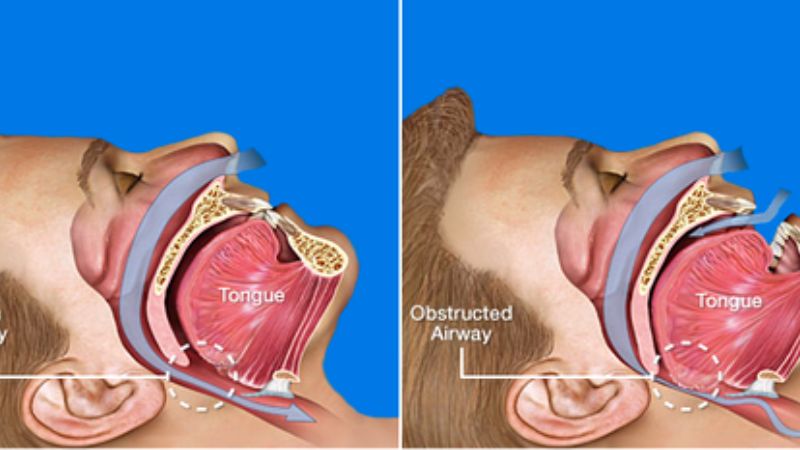Sleep apnea is a serious condition that can lead to dangerous health complications such as stroke, cardiomyopathy, and heart failure. To treat this syndrome, we need to adopt various measures related to our daily lifestyle and habits.
Let us guide you through a healthy diet that can help improve this condition.
1 What is Sleep Apnea?
Sleep apnea is a sleep-related breathing disorder. It is characterized by repeated episodes of cessation of breathing and reduced breathing due to obstruction of the airway during sleep, especially in people over the age of 50.
 What is Sleep Apnea?
What is Sleep Apnea?
2 The Dangers of Sleep Apnea
According to Dr. Pham Thi Bich Thuy from the Central Ear, Nose and Throat Hospital, sleep apnea can lead to several harmful health complications, including reduced oxygen levels in the blood and an increased risk of stroke.
Additionally, the consequences of sleep apnea can result in chronic fatigue, lack of focus, frequent headaches, insomnia, and even depression.
 Dangers of Sleep Apnea
Dangers of Sleep Apnea
3 Treatment Options for Sleep Apnea
The first step is to recognize the signs and symptoms of sleep apnea, which include loud snoring, rapid breathing, and repeated episodes of breath-holding for approximately 10 seconds.
In addition to seeking medical advice and following the doctor’s instructions, it is crucial to make the following lifestyle changes:
- Engage in regular physical exercise to improve overall health.
- Refrain from smoking and the use of stimulants such as alcohol and sedatives or sleeping pills at night.
- Adopt a nutritious diet with a focus on healthy foods that can improve this condition.
- Sleep on your side: This position helps maintain an open airway by preventing the tongue and jaw from blocking the throat.
 Treatment Options for Sleep Apnea
Treatment Options for Sleep Apnea
4 Healthy Diet for People with Sleep Apnea
To combat sleep apnea, it is essential to adopt a healthy diet that includes the following foods:
- Fish with high oil content or fish oil supplements: Examples include salmon, tuna, and sardines. Fish oil contains omega-3 fatty acids and EPA, which promote healthy blood flow and reduce inflammation, helping to keep the airways clear.
- Green, leafy vegetables: Rich in plant compounds and nutrients like vitamin K, these vegetables aid in mucus clearance, lower blood cholesterol, and support blood pressure control for hypertensive individuals.
- Low-fat dairy products: These help reduce snoring by balancing the moisture levels in the body, thereby minimizing the occurrence of sleep apnea.
- Honey: Known for its anti-inflammatory properties, honey can help soothe the airways. Consuming honey mixed with your favorite beverage before bed can reduce the risk of airway blockage.
- In addition, incorporate natural foods like citrus fruits, lean meats, and nuts with low-fat content into your diet.
 Healthy Diet for People with Sleep Apnea
Healthy Diet for People with Sleep Apnea
Along with adopting a healthy diet, it is essential to avoid certain foods and drinks:
- Deep-fried foods with high fat content: French fries, fried chicken, grilled meats, etc.
- Processed and pre-packaged foods: Instant noodles, potato chips, cookies, sugary cereals, and canned foods.
- Beverages with artificial sweeteners: Diet sodas, fruit juices with added sugar, and bottled teas.
 Foods and Drinks to Avoid
Foods and Drinks to Avoid
This article has provided insights into adopting a healthy diet to improve the condition of sleep apnea. We hope that you found this information helpful and that it will enable you to manage and reduce the symptoms of sleep apnea.
Source: Health and Life Newspaper
Creating a Sustainable Weight Loss Plan without Rigid Dieting
If dropping the pounds has become a challenge, small changes to your dietary habits can be a big help. Try incorporating more fiber-rich, nutrient-dense foods such as fruits, vegetables, and other foods that can boost your weight loss goals. Read on to learn more about easy approaches to successful weight loss through healthier eating.





































